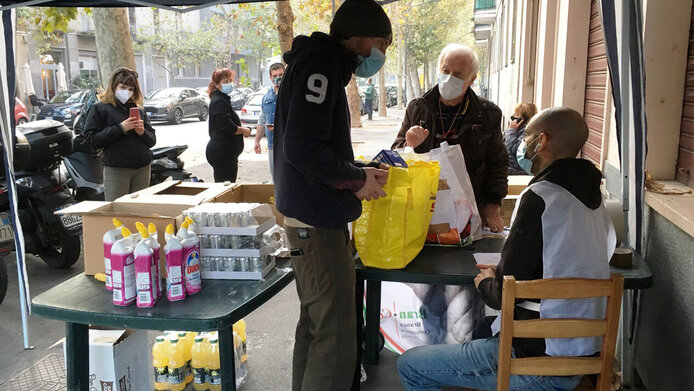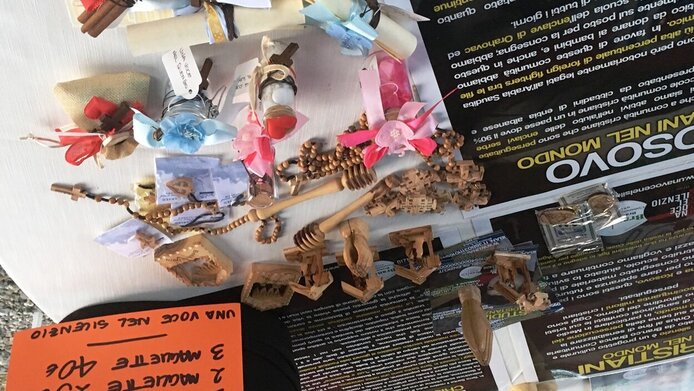The appeal of the right-wing scene

Phenomena such as far-right violence, the rise of far-right parties, xenophobia or the return of conservative values can be observed all over the world, and researchers feel increasingly under pressure to explain this rise of extremist right-wing activism. Social anthropologist Agnieszka Pasieka knows that the answer is just as complex as the forms of manifestation of the far-right scene. Albeit still widespread, the image of the far-right consisting predominantly in young men with shaved heads, tattoos and combat boots is no longer applicable, and the cliché blends increasingly with the image of “ordinary” citizens demonstrating civic engagement. What they share is their commitment to ideals that increasingly overlap with the concerns of some (far) left-wing actors, for instance with a view to environmental issues, anti-liberalism or corona scepticism. In short, right-wing ideologies are increasingly moving to the centre of society, using forms of civil engagement traditionally understood as left-wing. Pasieka's research focuses on the motives behind these forms of civic engagement and the complexity of the actors involved. “Among them we find football fans and unemployed young people as well as academics or successful entrepreneurs – their biographies are very different,” reports Pasieka, who does her research under an Elise Richter fellowship from the Austrian Science Fund FWF. As a cultural and social anthropologist at the University of Vienna, Pasieka has been conducting field research into far-right networks in several European countries for several years. In this context she also compares the mutual impact of local and transnational far-right practices.
Field research among the far-right
In her ethnographic investigations, Pasieka questions popular explanations and narratives and thinks it falls short of reality to attribute the popularity of far-right ideas to marginalisation or a lack of education. The same goes for the explanation that sees far-right communities as victims of neoliberalism. “One of the most important activities of militants is to engage in voluntary work, for example in orphanages, in animal welfare associations or in fundraising campaigns for single mothers and the poor,” Pasieka reports and adds: “This highlights the paradoxes of far-right messages, which increasingly and purposefully make reference to humanitarian intentions and positive visions of society and the future, while they are often portrayed as groups driven by hatred. The far right tries to counter this portrayal by emphasizing care and hope.”
For the researcher, social commitment is the force of attraction that far-right demands have for broader strata of society. In contrast to other organisations or NGOs, however, their focus is on supporting “our own people”, and not, for instance, on integrating migrants. In the face of a largely failed EU refugee policy and years of political debates focusing on border protection, far-right ideals seem to fall increasingly on fertile ground. The need for security and the fear of social decline are deeply rooted in large sections of society.
Local activism – transnational ties
In her comparisons of countries, Pasieka shows how and why local engagement and transnational networks influence each other. Her previous studies have taken her to far-right meetings and exchanges with activists in Poland – her own country of origin, Hungary and Italy. There, too, she sees further and different indications of the spread of far-right ideologies behind the much-cited historical and economic causes, such as post-communism, post-industrialism or the contrast between Western and Eastern Europe. “The Italian and Polish far-right has more in common than, for example, Polish and Czech far-right extremists,” says Pasieka. The two countries are both marked by high youth unemployment and a prevalence of Catholicism, and this fires up the far-right. In discussing their historical politics, Pasieka shows that the persecution of communists (Tito's partisans/Soviet army) is also an extremely important shared pattern in the narratives of Italian and Polish activists, but not among the Czechs. It is difficult to say how many activists there are in the respective countries, the anthropologist notes. The movements she is studying vary in size and, on average, have several hundred followers. The Italian right in particular has been growing in strength. Starting in the north, a right-wing network she is studying now spans the whole country, Pasieka reports. Pasieka's research in the right-wing European scene reveals, on the one hand, the nuances and differences of local movements, which make their appearance in diverse forms and cannot always be distinguished from other groupings, with which they share the characteristic of being bent on achieving their aims. “On the other hand, what unites them across borders and makes them dangerous,” notes Agnieszka Pasieka, “is their nationalistic world view, which paradoxically enables them to fight together, and across national borders, for a different Europe.”
Personal details Agnieszka Pasieka studied sociology in Krakow and received her doctorate in social anthropology at the Martin Luther University/Max Planck Institute for Social Anthropology in Halle/Saale. Her research focuses on religious and ethnic diversity, nationalism, migration and social history. She began her FWF-funded project “Living right: An Anthropological Study of Far-Right Activism” with a funding volume of about 300,000 Euros in 2018 at the Institute for Social and Cultural Anthropology at the University of Vienna.
Publications






